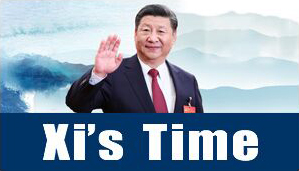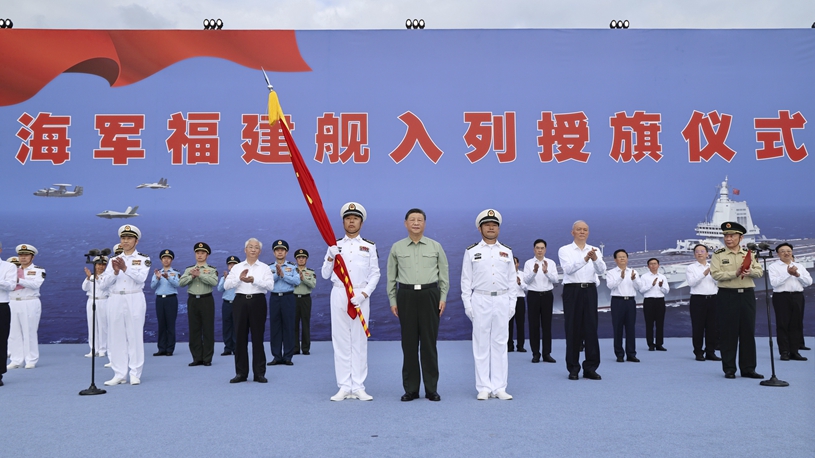Xi Focus: Xi leads China's drive for building sports powerhouse
Source: Xinhua
Editor: huaxia
2025-11-09 21:32:15
GUANGZHOU, Nov. 9 (Xinhua) -- President Xi Jinping declared China's 15th National Games open on Sunday, marking his fourth straight appearance at the opening ceremony of the nation's top multi-sport competition.
As China's top leader, Xi has made it a priority to build the country into a sports powerhouse and promote public fitness to improve people's health.
"When sports thrive, China grows stronger; when the nation prospers, sports flourish in return," he once said.
A sports enthusiast himself, Xi said he enjoys swimming -- a skill he learned in his childhood. He also likes hiking, football, volleyball, basketball, tennis and martial arts.
In 2016, during a visit to his alma mater, Beijing Bayi School, Xi stopped by a football field. "More than 50 years ago, I played here," he said as he watched the students train. "The exercise I did in my childhood laid the foundation for my good health today."
Xi believes sports foster character and willpower and has urged the all-round development of students in morality, intellect, physique and aesthetics.
"Chinese modernization is closely linked with public health," he said. "A healthy nation requires mass participation in sports, and strong competitive sports are built on a solid foundation of public fitness."
Xi attaches great importance to hosting major international sporting events, which many believe showcase China's transformation and progress.
While working in Shanghai in 2007, Xi oversaw the preparations for the Special Olympics World Summer Games, the world's leading sporting event for people with disabilities. He chaired meetings, inspected venues and followed preparations closely -- experience that became a valuable reference for organizing large-scale events across China.
After ascending to national leadership, Xi has led efforts to host the 2008 Beijing Olympic and Paralympic Games, the Nanjing Youth Olympics in 2014, and the Beijing Winter Olympics and Paralympics in 2022, events that have presented China to the world as a modern, forward-looking and open nation.
STRONGER COMPETITIVE SPORTS
In August 2024, less than 10 days after the Paris Olympics concluded, Xi met with China's returning Olympic athletes at the Great Hall of the People in Beijing, where he hailed their outstanding achievements and extended congratulations on their sportsmanship.
Xi called out the names of some athletes before they introduced themselves. He praised divers Quan Hongchan and Chen Yuxi, who won gold together. "You're known as the 'no-splash athletes,'" he said, referring to the duo's near-perfect diving performances.
Congratulating swimmer Pan Zhanle, who won gold and set a world record in the men's 100-meter freestyle, Xi encouraged him to keep up the good work and achieve even greater success.
Despite his tight schedule, Xi closely follows China's progress in competitive sports and the performance of its athletes.
Competitive sports results, Xi has said, are an important indicator of a country's comprehensive sports strength and progress made in building a sports powerhouse. China has consistently ranked among the top in Olympic medal tables and maintained strong performances in sports such as diving, table tennis, and weight-lifting.
Xi said that since shooter Xu Haifeng captured China's first Olympic gold in Los Angeles in 1984, the country has obtained more than 300 Summer Games titles.
When it comes to winter sports, Chinese athletes are strong in ice sports but less accomplished in snow sports. Xi encouraged them to consolidate their strength and catch up quickly.
In February 2019, Xi visited athletes who were preparing for the Beijing 2022 Winter Olympics. Among them was snowboarder Su Yiming, who later won China's first Olympic gold in snowboarding.
"He told us to aim high and show the world the spirit of China's new generation," Su recalled.
When China won its bid for the 2022 Winter Games in 2015, Chinese athletes had yet to compete in about one-third of the events. By the time the Games commenced, however, China realized full participation across all disciplines.
Under Xi's leadership, China's overall competitiveness in elite sports has continued to rise. Building on their strong Olympic results, Chinese athletes have continuously achieved a series of historic breakthroughs: the women's volleyball team reclaimed Olympic gold in Rio 2016, sprinter Su Bingtian set a new Asian record of 9.83 seconds in Tokyo 2020, and Zheng Qinwen became China's first Olympic women's singles tennis champion in Paris 2024. Since 2021, Chinese athletes have won over 500 world championship titles.
PROMOTING PEOPLE'S WELL-ROUNDED DEVELOPMENT
In 1984, Zhengding County in north China's Hebei Province held a county-wide sports meet, which featured events ranging from athletics, gymnastics to a series of public fitness programs.
At a time when local authorities elsewhere primarily focused on economic growth and paid less attention to sports, Xi, then Zhengding's top official, took a different view. Organizing a sports meet carries profound significance for enhancing people's happiness, he said. "The people's wallets are to grow fuller, their minds richer, and their bodies healthier."
After the sports meet, more sports venues were built and community sports teams were formed in Zhengding, which later became a national model county in sports.
A long-time advocate of sports for all, Xi has called for offering more convenient fitness facilities for the people.
During his tenure in Fujian Province, Xi worked to improve hiking facilities in the capital city Fuzhou, adding two new trails and installing lamp posts on a mountain popular with hikers.
During his local inspection tours as the country's top leader, Xi frequently interacted with locals doing exercise, encouraging cycling enthusiasts to keep fit on one occasion and calling for expanding public space for recreation and fitness on another.
In 2017, the 13th National Games included events for mass participation for the first time. The incorporation of public fitness, Xi said, better fulfills the purpose of hosting the Games.
He pays particular attention to youth fitness. While inspecting a sports center in Beijing in 2017, he greeted young ice hockey players with a shoulder bump and told them to grow even bigger.
"Physical exercise should start from an early age," he said while visiting a school in Beijing in May 2023. "The more they exercise, the more easily they can stay away from childhood obesity and myopia."
To achieve this goal, he has demanded sufficient physical education classes for students at a national education conference. Under his watch, a raft of policy measures have been rolled out in recent years, including guidelines on strengthening physical education in schools, an initiative to enhance students' fitness, and an action plan for myopia prevention and control.
As a result of elevating a fitness-for-all campaign to the status of a national strategy and issuing a five-year plan in this regard, a comprehensive institutional guarantee has been established in the country.
By the end of 2024, China's total sports venue area had reached 4.23 billion square meters, with over 38.5 percent of residents exercising regularly. The average life expectancy of the Chinese people has reached 79 years.
"The most important indicator of modernization is people's health, which underpins a happy life," Xi said.
BRIDGING DIVIDES FOR A SHARED FUTURE
"You have come not only as athletes, but also as goodwill messengers representing the Chinese people," Xi told Chinese athletes at the Sochi Winter Olympics in 2014. It was the first time a Chinese head of state attended a major international sports event abroad.
Xi has steadily consolidated and broadened China's circle of friends through sports diplomacy. As the Chinese president, he watched youth football friendly matches in Berlin, accepted a No. 10 jersey with his name on it during a visit to Argentina, and exchanged Olympic torches as gifts with his French counterpart.
During a state visit to Papua New Guinea in 2018, Xi watched a table tennis practice session between China's Olympic champion Zhang Yining and Geoffrey Loi, a local player. Thanks to international cooperation under the Belt and Road Initiative, Loi, who had received training in China, won silver with his teammate in the 2019 Pacific Games, the best result in the history of the country's national table tennis team.
Before attending the 15th National Games opening ceremony, Xi met with International Olympic Committee (IOC) President Kirsty Coventry and Honorary President for Life Thomas Bach in Guangzhou.
Xi told them that the Olympic spirit carries people's aspirations for a better world, and is highly consistent with China's vision of building a community with a shared future for humanity.
The remark echoed Xi's earlier calls to "let the light of sports break through the clouds of war" and to "foster unity through sports to gather positive energy for the international community."
In 2017, when he visited the Olympic Museum in Lausanne, Switzerland, Xi left these words in the guest book: "Carry forward the Olympic spirit and promote peace and development."
"President Xi is a true champion, and I want to give him a set of medals because he has a clear vision about the important role of sports in society, and the importance of sports for education for the young people," said Bach, then IOC president. ■





